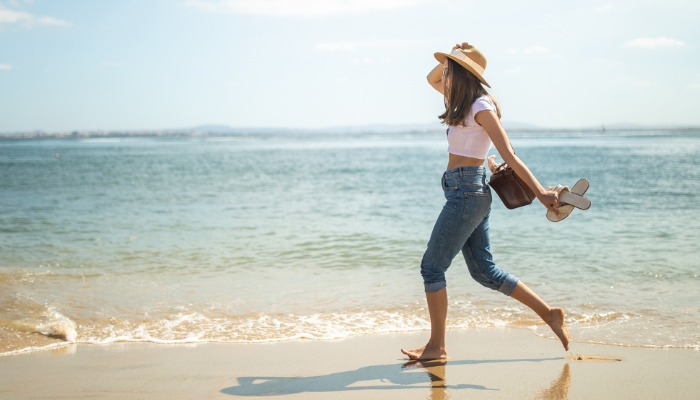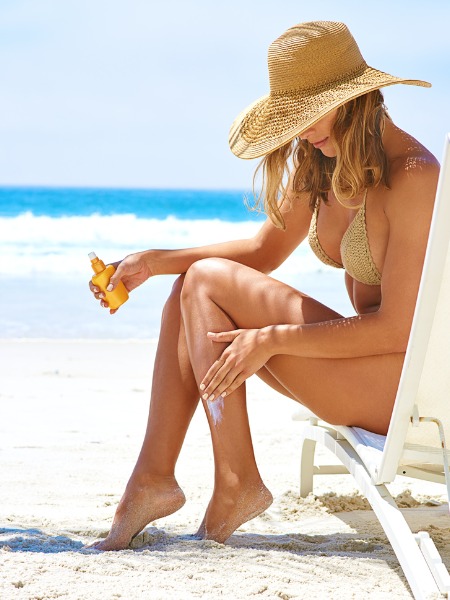Be sun smarter
In OTC
Follow this topic
Bookmark
Record learning outcomes

While foreign holidays are off the agenda for most people, staycations are not, and pharmacy customers will still need to take care in the British sun – even if there are clouds in the sky.
It’s that time of year again – summer holidays are on the horizon, but they're looking very different this time, with the opportunity for sun-soaked overseas holidays limited for most of us. However, UK-based holidays are possible, and it's just as important for community pharmacy teams to be aware of the dangers of the sun on our own home shores.
Skin cancer remains the most common type of cancer in the UK, so it's vital that people remain sufficiently protected from the harmful effects of UV exposure and are educated on correct sun protection procedures.
To coincide with National Sun Awareness Week in May this year, the British Association of Dermatologists (BAD) released worrying statistics which show that skin cancer diagnoses dropped significantly between April and November last year. The data, from the National Cancer Registration and Analysis Service, was published in the British Journal of Dermatology and highlighted a 28 per cent drop in numbers as a result of the pandemic. This equates to 2,671 fewer diagnoses than would usually be expected. Dermatologists are concerned about this, as it suggests these cancers are not being diagnosed early enough.
UV radiation can also damage the eyes, so it's advisable to wear sunglasses with good quality lenses to filter out UV rays. "Always look for a CE, UV 400 or British Standard mark," says the Eyecare Trust. “This ensures the sunglasses provide adequate UV protection."
Could do better
Skin cancer kills around 2,500 people each year in the UK. Awareness of the dangers of the sun is therefore vitally important. But alongside making sure customers know they should protect themselves from the sun in the UK as well as abroad, it appears they also need advice about the correct way to use sunscreens – how much to apply and when. A worrying statistic from Cancer Research UK suggests that 67 per cent of people still don’t use enough sunscreen to fully protect themselves from harmful UV rays.
Dylan Griffiths, professional expertise manager at Beiersdorf UK, says men appear to be less thorough than women when it comes to sunscreen application. And despite parental concerns about protecting their children, the amount of product applied to children is often less than is really needed. "The Eucerin 2018 assessment of children’s application highlighted issues," he says. "At the beginning of the study, 82 per cent of parents said they believed that they always/often applied enough sunscreen, but our analysis showed that, on average, 7 per cent of their children's skin was actually left non-sunscreen covered. In addition, 88 per cent of parents actually used less than the recommended amount of product. After being told the correct amount to use, 71 per cent admitted that they hadn’t realised the amount of sunscreen they actually needed."
Stephanie Young, marketing manager for the SunSense brand, agrees there should be more targeted education about the need for sun protection, and that people need to have the links between skin cancer and sun protection reinforced with advice and education. She explains: "For the majority of people in Australia, where SunSense is owned and made, applying SPF every day is second nature. However, the UK market still has a way to go in understanding the health and skincare benefits of daily sun protection."
In the UK, up to 80 per cent of UV radiation can penetrate through cloud cover, so even when the sun isn't shining, the danger of UV exposure is still present. Ms Young says pharmacy teams need to highlight how important it is for parents to take as much care of their own skin in the sun as they do of their children's. And tapping into the idea of maintaining beautiful skin can help to get the message across. "With the lines between sun care and beauty increasingly blurring, pharmacists can draw on beauty-focused messaging to encourage daily SPF wear in adults," she says.
Wearing appropriate clothing during sunny weather is the first line of protection from sunburn and skin damage. Wherever possible, it's advisable to keep as much of the skin covered – especially easily burned areas such as shoulders and ears. When in the water, it can help to wear a t-shirt and a hat to deflect the sun too. This is especially useful for children, people who burn easily and those who need to take extra care in the sun. Wide brimmed hats work best as they shade the head, face, ears and neck.
Join the campaign
The BAD's annual Sun Awareness Campaign runs from April to September. This year, the emphasis is on early detection, and the BAD is encouraging people to regularly self-examine for skin cancer. It is offering a range of materials that help educate consumers about the dangers of sun damage, as well as how to check skin properly for signs of skin cancer and more.
"With most of the population having spent much of the past year inside their homes, fewer people will have been checking their moles or skin for changes, or would have hesitated when they should have booked an appointment with their GP," suggests the BAD. Its downloadable information materials are available here.
Sun awareness packs, posters and downloadable resources are also available from SunSense here.
Brand news
• SunSense is offering a mix of promotional offers to stimulate category purchase, as well as educational content targeting consumers through its online platforms.
• The latest Eucerin sun protection launch is Actinic Control MD SPF 100, a daily use, light-textured fluid for the prevention of actinic keratosis and non-melanoma skin cancer. "An SPF 100 blocks out about 99 per cent of UVB-rays, and the high SPF can also compensate for sunscreen under-application," says the brand.
Top tips for sunscreen applications
 Anyone who is spending time in the sun should wear sunscreen on exposed areas of skin, such as the arms and face. "This will help protect the skin against cumulative sun damage," says a LloydsPharmacy spokesperson. In general, the advice to pass on to customers is this:
Anyone who is spending time in the sun should wear sunscreen on exposed areas of skin, such as the arms and face. "This will help protect the skin against cumulative sun damage," says a LloydsPharmacy spokesperson. In general, the advice to pass on to customers is this:
- Make sure sunscreen is applied to all exposed areas
- To ensure the correct amount is used, suggest 2mg per cm2, which is roughly two full fingers worth of product
- For the face, and for everyday use, suggest SPF30 at least, even if the weather is overcast
- Don't forget lips – suggest an SPF30+ lip balm
- Store sunscreen out of the heat and check the expiry date before use
- Apply generously: it takes at least six teaspoonfuls of product to cover an average adult’s body
- Apply sunscreen before insect repellents and make-up, and let it absorb before adding anything else to the skin
- Apply 20-30 minutes before sun exposure. Reapply after washing, swimming or being in water. This applies to water-resistant sunscreen too
Views of the P3pharmacy category panel
"We had virtually no sales last year due to people not being able to go abroad on holiday, but we are starting to get a few sales in preparation for this summer, whether that's for days out or holidays. Our best sellers are Nivea sun cream and sun spray. The most common questions we get are about the difference between products, SPF ratings, and what lasts longest. To improve your sales, place infographics near products and display information about the type of protection patients need."
Marisa Maciborka, Well Pharmacy, Hirwaun
"We anticipate a slow rise in sales this summer, with local and possibly some foreign holidays being allowed. Customers want advice on the best SPF for themselves and their families, and advice on aftersun if they get burnt. The Nivea range sells well for us; it's a known brand with good publicity to support it. There'll be no reason to hide your sun safety products once local and some foreign travel is allowed. They tend to be an impulse buy in pharmacies, so put them in an easy access area."
Lila Thakerar, Shaftesbury Pharmacy, Harrow
"We had that nice bit of weather in March so we got prepared; we remain hopeful for better over the summer. We are reminding people that just because they might not be going abroad on holiday – you might be swimming or cycling in the UK and have a breeze on your face – but you can still get badly burned. We're highlighting things customers might not think about, like choosing a lipsalve with sunscreen, for example, for when we do get some good weather."
Lindsey Fairbrother, Goodlife Pharmacy, Hatton, Derbyshire
